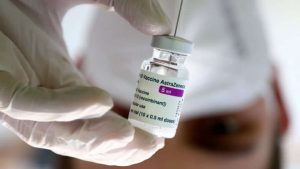Ontario moving ahead with 2nd doses of AstraZeneca COVID-19 vaccine

Ontario is moving ahead with providing a second dose of the AstraZeneca COVID-19 vaccine to some who received a first shot, officials said Friday.
Federal compensation not ready yet for vaccine injuries, deaths
Ontarians who got a first dose of the AstraZeneca vaccine between March 10 and March 19 may opt to receive a second one at a 10-week interval during the week of May 24.
That period encapsulates a pilot project that saw the province’s first doses of AstraZeneca administered through pharmacies in Toronto, Kingston and Windsor, as well as via primary care providers in some regions.
Those interested in getting a second shot at the 10-week interval should reach out to the pharmacy or primary care physician who provided their first dose, the province said in a news release. Those pharmacies and doctors will also try to contact eligible people.
Research suggests that a second shot of the AstraZeneca vaccine is most effective at 12 weeks, but Ontario currently has about 55,000 doses that are set to expire on May 31.
The revised plan was detailed by Dr. David Williams, Ontario’s chief medical officer of health, and Dr. Dirk Huyer, co-ordinator of the provincial outbreak response, at a morning briefing. The news came as the Ministry of Health said that a new record-high 158,524 doses of COVID-19 vaccines were administered in the province yesterday.
Williams and Huyer stressed that the AstraZeneca vaccine is safe and still relatively effective at a 10-week interval, with immunity approaching the level provided by mRNA vaccines like Pfizer and Moderna within a few weeks of a second shot.
“The risk of getting COVID still far exceeds any risk associated with the AstraZeneca vaccine,” Williams said.
As for those who got a first dose after March 19, the province is still finalizing plans for their second shot, Williams said. A strategy will be ready before the 12-week interval when the majority of people who got an Astrazeneca shot become due for another dose.
“When the time comes to receive a second dose, everyone who received a first dose of AstraZeneca will receive either an AstraZeneca or mRNA vaccine for their second dose,” Williams said.
Nearly one million people in Ontario received a first shot before the province, on May 11, pushed pause on administering any further doses over concerns about rare but potentially fatal blood cots.
Ontario also expects some 254,000 more doses to land soon.
Williams and Huyer said they were considering options for what to do with the additional doses coming. They said they were closely watching results from the United Kingdom, where researchers are studying the implications of mixing the AstraZeneca vaccine with mRNA vaccines made by Pfizer and Moderna.
Williams said that the province believes mixing vaccines to be safe, but it is awaiting updated guidance from the National Advisory Council on Immunization (NACI).
Health Minister Christine Elliott said Thursday that Ontario is ready to get the AstraZeneca doses into arms.
“We are waiting for the final recommendations (from experts) on what we should do with the AstraZeneca vaccine,” Elliott said.
“Data from the U.K. indicate that any problems with the second shot are far less,” she said.
The risk of a blood clot from a first dose of the AstraZeneca vaccine is estimated to be roughly one in 55,000. The risk for a second shot is about one in about 600,000, Williams said today.
Justin Bates, head of the Ontario Pharmacists Association, said the organization supports using all of the available doses of AstraZeneca.
Bates said it would take a concerted effort to get the shots in arms before expiry. Patients would also need to provide informed consent around dosage intervals and relative risks, which he said were far outweighed by the potential benefits.
Record-high vaccinations
Meanwhile, Ontario reported 1,890 new cases of COVID-19 this morning, alongside 27 deaths.
The seven-day average for cases, which helps smooth out spikes and lulls in the data, now stands at 2,064, which is the lowest it has been since March 28.
Due to the cyclical nature of testing throughout the week in the province, it’s generally better to compare the same day with previous weeks to get a sense of how the pandemic is changing.
By that metric, cases are dropping at an encouraging rate, down from 2,382 last Friday.
Of the new cases, 469 were confirmed in Toronto, 468 in Peel Region, 165 in York Region, 111 in Hamilton and 107 in Durham Region.
Labs completed 37,126 tests, the fewest reported on a Friday since September, and Public Health Ontario logged a provincewide positivity rate of 5.4
Testing levels on the whole have fallen in recent weeks, though so too have positivity rates.
The total number of patients in hospitals with COVID-related illnesses continued its steady drop to 1,265, 55 fewer than the day before. The number of people in intensive care also decreased by six, down to 715.
The number of patients that required a ventilator, however, jumped by 17. As of yesterday, there were 510, or about 71 per cent of all patients in ICUs, who were vented.
The province’s calculation of the effective reproduction number, which measures how many people one person with the virus would go on to infect, stands at 0.86. That figure has to stay below one for spread of the virus to continue to slow.
In total, 7,735,148 doses of COVID-19 vaccines have been administered so far in Ontario. Nearly 59 per cent of Ontarians 16 and older have had at least one dose.
Announcing the provincial government’s new three-phase reopening plan yesterday, officials said that at least 60 per cent of adults would need to have a first dose before moving forward into phase one, among other important thresholds.








Redes Sociais - Comentários